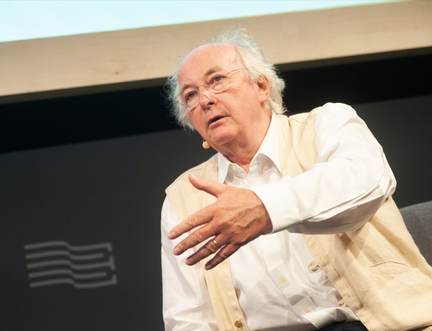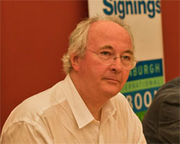More articles Sunday 12 August 2018 12:00pm
'Strong Female Characters Don’t Require Weak Males' insists Philip Pullman in Book Festival event

Philip Pullman, known for writing strong female lead characters including Lyra Belacqua in His Dark Materials, and Sally Lockhart from The Ruby in the Smoke – believes that 'to portray a strong girl, you don’t have to portray a man or a boy being weak. My boys and my men are strong as well as the women.'
The award-winning author was speaking with crime writer Val McDermid at a sold out event on the opening day of the 2018 Book Festival.
He insisted, however, that while he hoped that 'any sensible person would want to be a feminist,' he hadn’t consciously written the stories with that intention.
'I can’t really be sure what my intention was,' he said. 'In any case, you can’t intend to write a good book. You can intend to buy your wife a Christmas present or phone the plumber, but you can’t intend to write a good book — you can intend to write a book. Besides, we’re not always aware of what our intentions are. There are all kinds of mysteries about why we write one story rather than another.'
Later, in response to an audience member’s question, Pullman reaffirmed his opposition to any idea of categorising books by age group. 'This was the occasion of a great struggle between us, the authors – the good people – and the publishers – the bad people – some years ago, when the publishers wanted to introduce a way of categorising books—for example, “Suitable for ages eight to nine” or something.
'We fought this with a passion,' he said. 'There’s nothing we wanted less than for our books themselves to say who was going to read them. There were all kinds of reasons why it was a terrible idea, not least that children who might have been 12 or 13 may have had a reading age of eight or nine. A book might have been ideal for them, but would they be ashamed being seen reading it? I just hate the idea of trying to tell a story and somebody at the door keeping people out. I want to welcome people in.'
He accepted that booksellers, librarians and teachers did need to know whether or not the child or children in their care would enjoy a book, 'But they can do that by reading the book and making their own judgement about it. Every book is different, every child is different. The best sort of librarian is the one who says: ‘Oh, you’ve just read that; well you might enjoy such and such.’
'That’s why every school should have a library with a librarian in it.'
Look, Listen & Read


 Major new partnership with Celtic Connections
Major new partnership with Celtic Connections 

